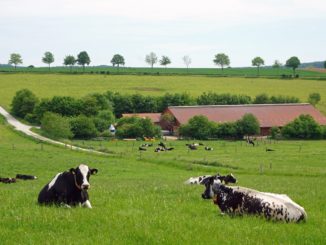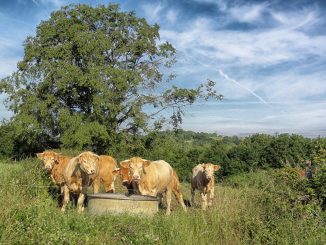
 Can the EU achieve the urgently needed re-construction of the Common Agricultural Policy? ARC2020’s president Hannes Lorenzen on the causes of the European farmers’ protests, the EU’s panic deconstruction of farm policies, and why civil society must deliver now.
Can the EU achieve the urgently needed re-construction of the Common Agricultural Policy? ARC2020’s president Hannes Lorenzen on the causes of the European farmers’ protests, the EU’s panic deconstruction of farm policies, and why civil society must deliver now.
This interview was conducted at the end of January 2024 by Eva van de Rakt, head of the European Union and North America division of the Heinrich Böll Foundation. It originally appeared in boll:thema “Europa – ein Versprechen” (Europe – A promise).
Eva van de Rakt: You have been working as an expert, political advisor and civil society representative on the reform of the EU’s Common Agricultural Policy for decades. What are the biggest construction sites in this central policy area for the EU?
Hannes Lorenzen: The Common Agricultural Policy (CAP) has been one never-ending construction site for decades. The worrying thing is that there is no recognisable construction plan. Since the 1980s, scaffolding has been erected everywhere for renovation projects that cost a lot of money but sooner or later collapse again. Environmental, animal and climate protection, for example, are construction sites without any significant progress because they are used as embellishment in agricultural policy structures that are no longer up to date.
What do these outdated structures mean in practice?
Farmers continue to be driven in the wrong direction: Regardless of losses, they are expected to keep growing and producing more and more. This destroys the environment, the soil, water, diversity and the climate. More and more farmers are falling by the wayside, more and more food is being wasted, more and more meat is being exported – and the slurry stays here. The CAP was once a pillar of cooperation and integration for Europe. Now it is a reminder of the inability of the Member States and the Commission to reconcile our food supply with the major challenges of our time: the transformation of agriculture into a culture that is compatible with people, the climate and nature.
What would the Common Agricultural Policy have to look like in order to no longer be a construction site in the future and to make a significant contribution to implementing the objectives of the European Green Deal?
Ursula von der Leyen announced the Green Deal as a “Man on the Moon” moment, as the great leap forward with which Europe is breaking new political and economic ground in an exemplary manner for the world. If you take a closer look at the progress made in the area of agricultural policy, the rocket has not even taken off yet. On the contrary, more and more parts are being removed from the engines and control units of the Green Deal, allegedly because they are putting too much strain on the launch for the project.
The agricultural industry and the farmers’ associations closely aligned to it have done it together: the reform of agricultural policy is in an unchecked rollback from the Green Deal. The measures announced, i.e. the Farm to Fork strategy, the legislative framework for a sustainable food system, the Nature Restoration Law and the regulation to reduce the use of pesticides, are all sadly false starts.

How can these false starts be compensated for?
A sustainable CAP would have to make a completely new start. Subsidies should exclusively promote the transition to agroecological systems and diverse, small-scale land management. A rural development policy should build the necessary decentralised, critical, economic and social infrastructure to create local, crisis-proof food systems. Funding should not be distributed according to hectares, but according to progress in reorientation and meaningful employment. And farmers should be able to generate their income from fair competition on the market as well as from cooperation with each other and with local food businesses. External protection against social and eco-dumping imports is also part of this, as is a public health policy to accompany this new start.
It is not only in Germany that many farmers are currently unleashing a tremendous amount of anger. In the Netherlands, France, Poland and Romania, too, they have taken to the streets in recent months, sometimes leading to violence. Why are these protests so burning?
It is the eternal construction sites and the lack of planning on the part of those responsible in the Member States and in Brussels. But it is also the population’s lack of knowledge and interest in the situation in which many farms in the EU find themselves. The hardship cannot be seen at the store counter, but it can now be seen and heard on the streets. The removal of diesel subsidies was the straw that broke the camel’s back, but the mood was already boiling long before that. Even those who have been on the road to ecological agriculture for a long time do not see why they should have to meet more and more – and sometimes completely nonsensical – requirements, while their income is constantly fluctuating, declining or has become unpredictable. Those who take conversion seriously have more work and a high economic risk. This is not sufficiently remunerated and hardly appreciated.
Fortunately, farmers are not completely alone: “We’re fed up”, the annual demonstration by a broad alliance during the Green Week, shows how much unity is possible in the fight for the agricultural transition.
How can and should we respond to the anger?
Warm words, understanding without personal political commitment, announcements about wanting to support small businesses without simultaneously and proactively launching concrete measures: This no longer helps, on the contrary. It only increases the anger. Above all, the cuddling up to the farmers’ association and the tacit agreement with the agricultural and food industry have massively damaged the credibility of the announced agricultural transition.
What consequences could this loss of credibility have?
If the moment is missed in which the National Strategic Plan for the reform of the Common Agricultural Policy can be made fit for an ambitious agricultural transition – like in Germany -, then advertising restrictions on unhealthy foods will no longer be of any use. An action plan for a green Common Agricultural Policy of the future should be part of the public debate on the future of agriculture and Europe now, before the elections to the European Parliament and before the new European Commission starts work. Otherwise it is to be feared that the farmers’ protests will only further fuel the rollback in agricultural policy.
In Germany, domestic intelligence services are warning that right-wing extremists could infiltrate the farmers’ protests. How do you assess this danger?
It is big. The AfD and its European supporters have simple answers: get rid of the traffic light coalition, get rid of the Greens, get rid of the EU, get rid of the agricultural transition, then the issue of climate change will also be gone. Our responses to the many crises coming down on us require considerable effort. It requires empathy, respect, listening, explanations, and support for cooperation. It’s just like in real life. That’s what we need to do. We must deliver.
2024 will be the year in which democratic parties could slip into the minority in some countries and regions. Our task then will be to slow down the great rollback and reposition ourselves on many different levels. The development in Poland gives us hope, but it also shows how difficult it is to revive insight and reason once they have been lost.
Future enlargement rounds will pose additional challenges for the EU in the area of agricultural policy. What needs to be considered before Ukraine, Moldova, Georgia and the Western Balkan countries become members of the EU?
Ukraine’s accession is the elephant in the room of the current deliberations on the next agricultural reform in 2027. The Commission fears that the animal could move and break the good china, and is therefore not moving itself. The established farmers’ associations are moaning loudly, warning of price competition from the East and demanding compensation payments. In fact, the supposed certainties of the current CAP would vanish into thin air if Ukraine were to join. Given the size of the farms, payments per hectare, as they exist now, would either extremely inflate the agricultural budget or cause it to burst immediately. Agricultural structures and yields per hectare are comparable to those in the USA and most farms in the EU would not be able to cope with the competitive pressure.
The situation would be different in the Western Balkans, Moldova and Georgia, as the countries in this region have predominantly small-scale farming. The agricultural transition would, with regard to these structures as well as to the need for agroecological adaptation in Ukraine, be unavoidable. Accession will come at some point. Not because it is promised again and again, but because the EU needs it. The people in the Western Balkans are already deeply disappointed by the eternal stalling and inaction. This is another reason why the restart of the CAP is so important.
What does this mean in concrete terms for Ukraine?
The interests of Ukraine’s agricultural industry are currently being represented very intensively in Brussels. The issue is the sale of Ukraine’s grain and meat surpluses to the EU, which initially led to the farmers’ protests in the Eastern European member states and now throughout the EU. It would be wrong to support these interests of the international corporations operating there out of solidarity with Ukraine.
Instead, the conditions for accession and for further payments from Brussels must be linked to criteria in all Member States. These criteria must promote production methods and an infrastructure that support farmers in an enlarged EU in keeping animals in a species-appropriate manner, promoting soil fertility and protecting the climate. None of these criteria are currently decisive in either the EU or Ukraine and are unfortunately part of the current agricultural policy rollback. Without a profound reorientation of the CAP that includes Ukraine, accession will be a disaster for the entire EU. This can and must be prevented.
More
EU’s Nature Restoration Law at Critical Juncture after Pushback by Member States
Protests and Love – France’s Farmer Organisations, Demonstrations and Social Alliances




